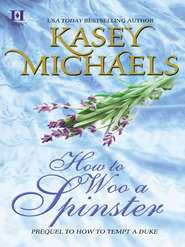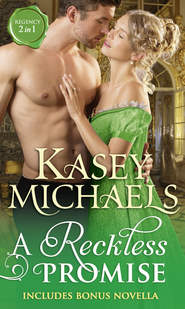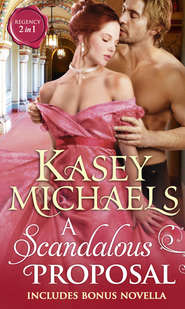По всем вопросам обращайтесь на: info@litportal.ru
(©) 2003-2025.
✖
The Secrets of the Heart
Автор
Год написания книги
2018
Настройки чтения
Размер шрифта
Высота строк
Поля
And Charles knew she counted on his memory, damn his hunt-mad, philandering hide to perdition!
In the end, there had been nothing else for it but to live with the consequences of her mate’s selfishness, and Lady Undercliff had been forced to take her pleasure where she found it, which is the same as to say that the tradesmen’s bills her dearest husband Charles would find falling like snow upon his study desk in the next weeks would much resemble a blizzard.
Lady Undercliff had always taken great pride in her ability to delight both her guests’ eyes and stomachs with her lavish entertainments, but she had definitely outdone herself in her preparations for this particular ball.
The delicately draped bunting that hung everywhere, the dozens and dozens of ceiling-high plants, the hothouse bouquets, the rented gilt-back chairs, the painted cherubs and other statuary, the hiring of a score of servers, the presence of musicians in three drawing rooms in addition to those in the ballroom, the luscious sliced salmon, the dazzling variety of Gunther ices, indeed, even the silver-on-silk gown and flashing diamonds worn by the lady herself—all had been ordered with a glib “And have all bills forwarded directly to my husband, the earl.”
And yet, with the hour relentlessly creeping toward midnight on the evening of the ball, and with the compliments of the happy partygoers still ringing in her ears as she remained adamantly at the top of the stairs, Lady Undercliff continued to pout.
“This is entirely your fault, Charles,” she sniped at her husband, who was most probably wishing himself away from the receiving line and safely ensconced in the card room, a drink at his elbow, although she’d not give him that satisfaction. “He isn’t coming.”
“Prinny?” Lord Undercliff asked, frowning. “Who wants him here anyway, Gert? We’d have the servants scraping rotted eggs from the windows for a week if the populace caught sight of him rolling his carcass in here. Ain’t the least in good odor with the masses, you know—or you would, if you weren’t always worrying about all the wrong things.”
“Not his royal highness, Charles,” Lady Undercliff gritted out quietly from between clenched teeth, “as if I’d want that terrible old man lumbering in here with his fat mistress and shoveling all that lovely salmon down his greedy gullet. And don’t call me ‘Gert’! The man I am speaking of is St. Clair.”
Lord Undercliff looked at his wife down the length of his considerable nose. “St. Clair? That pranked-out mummer? Thunder an’ turf, now you’ve gone and slipped your moorings, Gert. What is he to anything? He ain’t but a baron. You’ve got three marquesses, a half dozen earls, and two dukes cluttering up the place already. What do you need with St. Clair?”
“You don’t understand,” Lady Undercliff spat. “But then, you never do. He must be here!”
“Yes, yes. He’s amusing enough, I’ll grant you that, but I can’t say I like what he’s done to our young men. Everything poor Beau has taught them about proper dress seems to have flown out the window thanks to St. Clair and his colored satins. Soon he’ll have us all powdering up our heads, Gert, and if he does that I just might have to call him out myself. Demmed nuisance, that powder, not to mention the tax. Besides, didn’t we turn the powder closet into a water closet just a few years past?”
Lady Undercliff gripped her kid-encased hands together tightly in front of her, knowing that if she did not win this struggle to control her overset emotions she would soon plant her beloved but woefully obtuse husband a wisty facer straight on his mouth.
“Charles, I don’t care a fig if St. Clair has all you gentlemen shaving your heads and painting your pates purple. No party is a success unless he attends. No hostess worth her salt would dare show her face in public again if Christian St. Clair deigned to ignore her invitation. Now do you understand, Charles? And it’s all your fault—you and your stupid hunting box. I’ll never forgive you for this, Charles. Never!”
“Females!” Lord Undercliff exploded, slapping his thigh in exasperation at his wife’s outburst. The single life was much preferable, he had often been heard to remark, if only there existed some way of setting up one’s nursery without having to shackle oneself with a bride who was never the sweet young beauty you thought she’d be but only a female like any other, with contrary ways no man could ever fathom, shrewish voices, and feathers for brains.
He peered past his wife and into the crowded, overheated ballroom. “You’ve got Lord Buxley, Gert. He’s popular enough. And that Tredway chit as well. Wasn’t she the toast of London last Season?”
“Yes, Charles—last Season,” Lady Undercliff informed her husband tersely. “Lady Ariana Tredway lends the party some cachet, as does Lord Buxley, but my primary coup for this evening seems to be the presence of Gabrielle Laurence, although I cannot for the life of me understand the attraction. Red hair, Charles. I mean, really! It’s not at all ? la mode.”
Peering around his wife once more, Lord Undercliff caught sight of a slim, tallish girl waltzing by in the arms of the thrice-widowed Duke of Glynnon. He could not help but remember the chit, for he had bowed so long over her hand during his introduction to her in the receiving line that his wife had brought the heel of her evening slipper down hard on his instep to bring him back to attention.
Miss Laurence’s lovely face, he saw now, was wreathed in an animated smile as she spoke to the duke, her smooth white complexion framed by a mass of lovely curls the color of fire that blazed almost golden as the movements of the dance brought her beneath one of the brightly lit chandeliers. He grinned, remembering her dark, winglike brows, her shining green eyes, and, most especially, the small round mole he’d noticed sitting just to the left of her upper lip. Ah, what a fetching piece!
“Your judgment doesn’t seem to be bothering the duke overmuch, Gert,” Lord Undercliff remarked in an unwise attack of frankness, sparing a moment to catch a glimpse of Miss Laurence’s remarkably perfect bosom, which was modestly yet enticingly covered by an ivory silk gown. “As a matter of fact, I believe old Harry is drooling.”
“Oh, go back to Scotland, Charles, until you can learn to control yourself,” Lady Undercliff spat out, then broke into her first genuine smile in a month. “He’s here! Charles, darling, he’s here! Stand up straight, and for goodness sake don’t say anything stupid.”
Lord Undercliff, once a military man and therefore accustomed to taking orders, obeyed his wife’s command instinctively, squaring his shoulders and pulling in his stomach as he turned to greet their tardy guest and his small entourage of hangers-on, a wide, welcoming smile pasted on his lordship’s pudding face.
“Lady Undercliff! Look at you! Voyons! This is too much! Your beauty never ceases to astound me! I vow I cannot bear it!” Lord Christian St. Clair exclaimed a moment later, having successfully navigated the long, curving marble staircase to halt in front of the woman and execute an exquisitely elegant bow, while gifting her hand with a fleeting touch of his lips.
Lord Undercliff’s own lips curled in distaste as he watched this ridiculous display, taking in the baron’s outrageous costume of robin’s-egg-blue satin swallowtail coat and knee breeches, the elaborate lace-edged cuffs of his shirt, the foaming jabot at his tanned throat, the high collar that by rights should have sliced off the fellow’s ears by now.
The man was a menace, that’s what he was, bringing back into fashion a fashion that hadn’t been fashionable in years. And the young males of Society were following him like stunned sheep, more and more of them each day sauntering down Bond Street in clocked stockings, huge buckles on their shoes, and wearing enough lace to curtain a cathedral.
“I throw myself at your feet, beseeching mercy. A thousand pardons for my unforgivable tardiness, dear lady, please, I beg you,” Lord St. Clair pleaded, rising to his full six foot three of sartorial splendor to gaze adoringly into Lady Undercliff’s rapidly widening eyes.
“I had been dressed and ready beforetimes, eager to mount these heavenly stairs to your presence,” he lamented sadly, “but then dearest Grumble here observantly pointed out that the lace on my handkerchief—” he brandished an oversized, ornate lace handkerchief as proof “—did not in the slightest complement that of the rest of my ensemble. Imagine my dismay! There was nothing else for it but that I strip to the buff and begin again.” He sighed eloquently, looking to Lord Undercliff as if for understanding.
He didn’t receive any. “Could have just changed handkerchiefs, St. Clair,” his lordship countered, he believed, reasonably. “Or left off altogether trailing one around with you everywhere like some paper-skulled, die-away miss with a perpetual fit of the vapors.”
St. Clair’s broad shoulders shook slightly as he gave a small gulp of laughter that soon grew to an appreciative if somewhat high-pitched giggle. “Sans doute. Ah, Undercliff, what I would not give to find life so simple. Grumble,” he said, turning to George Trumble, one of his trio of constant companions, “how naughty of you not to point out that alternative to me. No, don’t say anything,” he continued, holding up a hand to silence his friend, who hadn’t appeared willing or able to answer. “I remember now. My affections lay more deeply with the handkerchief than the remainder of my costume. Forgive me, Grumble. Ah, well, no hour spent in dressing is ever wasted.”
“Only a single hour—for evening clothes?” Lord Undercliff spluttered, giving the baron’s rig-out another look, this time appreciating the cut of the coat, which was not quite that of the past century but more modern, with less buckram padding, flattering St. Clair’s slim frame that boasted surprisingly wide shoulders and a trim waist. And the man’s long, straight legs were nearly obscene in their beauty, the thighs muscular, the calves obviously not aided by the careful stuffing of sawdust to make up for any lack in that area.
“Used to take Brummell a whole morning just to do up his cravat,” his lordship continued consideringly, wondering if sky-blue satin would be flattering to his own figure. "Just pin that lace thing-o-ma-bob around your neck and be done with it, don’t you? And the ladies seem to like it. Maybe you have something here, St. Clair. Thought satins would take longer, but if they don’t—well, mayhap I’ll give them a try m’self. Rather weary of Brummell’s midnight blue and black, you know.”
“Charles,” Lady Undercliff interrupted, her smile of pleasure and triumph at having snagged St. Clair for her ball rapidly freezing in place as she listened to her bull of a husband making a cake of himself, “you are neglecting our other guests. Lord Osgood, Sir Gladwin, Mr. Trumble—we are so pleased you’ve agreed to grace our small party this evening.”
Lord St. Clair stood back to allow his friends to move forward and greet their host and hostess, which they did in order of their social prominence.
Lord Osmond Osgood, a tall though rather portly young gentleman known to his cronies as Ozzie, was first to approach, winking at the earl before clumsily bowing over her ladyship’s hand and backing away once more, nearly tripping over his own feet.
Sir Gladwin Penley, his usual uninspired gray rig-out brightened by his trademark yellow waistcoat, simultaneously apologized for his tardiness and grabbed hold of Lord Osgood’s forearm, saving that man from an ignominious tumble back down the staircase. “My delight in the evening knows no bounds, my lady,” he intoned solemnly, giving no hint to the fact that he’d been dragged to the Portman Square mansion under threat of having St. Clair in charge of the dressing of him for a fortnight if he cried off in favor of the new farce at Covent Garden.
George Trumble was the last to bow over Lady Undercliff’s pudgy hand, keeping his comments brief and hardly heartfelt, for everyone was aware the only reason an invitation had been delivered to his door was the usual one: If George Trumble were not one of the party, then the hostess could go cry for St. Clair’s presence. “How good of you to invite me, your ladyship,” he said quietly, then turned his back on the woman before she could be sure she’d seen cold disdain in his eyes.
But if George Trumble knew he was here on sufferance, and Sir Gladwin Penley may have already been wishing himself elsewhere, and Lord Osmond Osgood might be wondering how soon they could leave without causing a stir, Baron Christian St. Clair’s posture showed him to be in his element.
He turned back to Lady Undercliff and offered her his arm, telling her without words that it was no longer necessary for her to stand at the top of the stairs now that the premier guest had arrived.
And if the Prince Regent did dare venture out of Carleton House under cover of darkness to attend, well then, he could just find his own way into the ballroom.
With her ladyship at his side, and Lord Undercliff following along behind with the remainder of the St. Clair’s entourage, the baron entered the ballroom just as the clocks all struck twelve, stopping just inside the archway to gift the other occupants of the room with a long, appreciative look at the magnificence—indeed, the splendor—that was Baron Christian St. Clair.
MISS GABRIELLE LAURENCE was enjoying herself immensely, as befitted both her hopes for her debut and the reality of the past ten days that had found all her most earnest wishes coming true. For her instant success within the rarefied confines of Mayfair and the select members of the ton was not the result of mere happenstance.
Gabrielle had planned for it—indeed, trained for it—and if her smile was brighter than most, her manner more ingratiating, her conversation more scintillating, her behavior, her gowns, her air of vibrancy more interesting than was the case for any of the other hopeful debutantes, those young ladies who were not enjoying a similar success had only themselves to blame.
The Undercliff Ball had proven to be another feather in Gabrielle’s figurative cap of social success, the evening thus far a never-ending whirl of waltzes with dukes, cups of lemonade brought to her by adoring swains, effusive compliments on her “ravishing” gown, her “glorious” hair, her “rosebud” lips, and even a single stolen kiss on the balcony, especially when she considered that the “thief” had been no less than Lord Edgar Wexter, heir to one of the premier estates in Sussex.
All in all, Gabrielle Laurence was at this moment a very happy young woman, which explained her sudden chagrin when she belatedly realized that the young viscount she had been regaling with the latest gossip about Princess Caroline was no longer listening to her but instead staring in the general direction of the doorway, his usually vacant blue eyes glazed over with slavish admiration.
Gabrielle sighed, snapping open her fan to furiously beat at the air beneath her softly dimpled chin. “I’d look,” she said to herself—for the viscount certainly didn’t hear her, and probably wouldn’t if she screamed the words at him—“but I already know what I would see. It’s that overdressed ape St. Clair, isn’t it?”
No matter where she was, Gabrielle knew she could not for long escape hearing about Baron Christian St. Clair, arbiter of fashion, purveyor of inane wit, and the single man who held the power of social life or death over the members of the ton.
No matter what she was doing, her enjoyment of the moment could be instantly reduced to ashes by his entrance onto the scene, where he immediately became the cynosure of all eyes, the center of the social universe.
The man wielded more power than the Prince Regent, held more social consequence than Beau Brummell had ever commanded, and was more sought after than the Duke of Wellington, hero of the late war against Bonaparte.
It was indecent the way Society fawned over the man, adopting his ridiculous fashions, aping his effeminate ways, shunning green peas on Tuesdays because he did, strolling rather than riding in the park because he abhorred horses, eagerly hopping through each foolish hoop he set up for them as if his every drawled inanity were gospel, his every soulful sigh to be worried over, his every smile to be cherished as if a gift from the gods.
It was enough to make Gabrielle Laurence wish she could dare turning her back on the man.
Which, of course, she couldn’t, not without risking social disaster.











